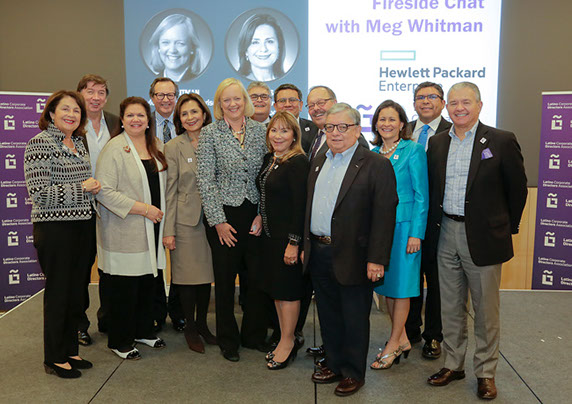

Convening for Diversity
The U.S. Hispanic population has become a priority for companies that produce consumer goods, media content, automotive and financial products, among others. Its influence is surging with 57 million people identifying as Hispanic and wielding a combined purchasing power that would constitute the world’s 14th largest economy. More than 80% of all new business formations in this country over the last five years were by Latino entrepreneurs. Yet, this compelling picture of Latino clout contrasts with the underrepresentation of Latinos in the C-suite and the boards of directors of American corporations.
During this year’s Hispanic Heritage Month, when there was a flurry of activity touting Hispanic contributions, a group of preeminent business leaders met in the heart of Silicon Valley to address the paucity of Latinos in America’s corporate boardrooms.
It was the inaugural convening of the Latino Corporate Directors Association (LCDA), the first membership association to address the low percentage of Latinos on corporate boards. At present, Hispanics hold 2.5% of F500 boards and 2.1% of the Fortune 1000 company board seats; that’s just 135 and 208 seats respectively.
The convening on October 6-7 was hosted in Palo Alto by Hewlett Packard Enterprise (HPE), and featured three CEOs with some of the most diverse boards in the region: Meg Whitman of HPE, Dion Weisler of HP, Inc., and Bernard Tyson of Kaiser Permanente.
With a packed agenda, LCDA members and guests attended director education sessions on timely board-related topics; and heard from some of the leading authorities on corporate governance, board searches, technology and cyber security, and the role of investment firms in advancing board diversity.
During a “fireside chat” with LCDA founding chair Patricia Salas Pineda, Meg Whitman, who is also board chair of HP, Inc., reflected on the challenge she faced in getting a diverse slate of board prospects when Hewlett Packard split into two companies in late 2015 and she had to build two boards. Whitman tasked the executive search firm: “Go find me the list of the most powerful Latinos in business,” after the firm did not generate any Latinos for the candidate pool. “If you don’t request a diverse slate, you won’t get one,” Whitman asserted. As a result, Aida Alvarez, a founder of LCDA and the first Hispanic woman to serve on a U.S. President’s Cabinet, was named to the board of HP, Inc. earlier this year.
Featured luncheon speaker Joseph Grundfest, Stanford Law School professor and senior faculty at the Rock Center for Corporate Governance, cautioned that success will be largely based on the ability to create “channels of influence” and cultivate a network of champions of diversity within existing boards.
Strategically, LCDA’s mission is indeed aligned with Grundfest’s belief that peer-to-peer networks work best in opening doors to the boardroom. President and CEO Esther Aguilera laid out an ambitious LCDA agenda to grow the pool of high-caliber Latino board candidates and work proactively with corporations, board members, search firms, the investment community and other partners. Aguilera, an accomplished Washington, D.C. executive who joined LCDA in June, brings a 25-year record of successfully developing and executing strategic business plans for growth and impact. “The convening in Palo Alto put us on the map,” she said.
Alvarez is optimistic about the association’s impact. “The convening exposed LCDA to multiple influential communities and each panel affirmed that LCDA has an important role to play in shaping the leadership landscape of corporate governance,” she commented.
Pineda, who spent more than 30 years at Toyota and serves on the boards of Levi Strauss & Co and Frontier Airlines, said, “This has been a landmark year for LCDA in terms of membership, programming and strategy. Our roster grew 50% in one year to more than 75 members presently. The success of the convening validates our belief that increasing the number and influence of qualified Latino executives on corporate boards is good for business.”
Although the convening reinforced the central premise that diverse boards perform better, there was consensus that access to the boardroom remains a significant barrier in the struggle for corporate leadership structures designed for success with the new Latino mainstream.
Case in point, search firm Heidrick & Struggles’ 2016 report Mapping Incoming Boardroom Talent, found that Latinos remain the most underrepresented major demographic group in the boardrooms of corporate America, and that the needle is not moving.
And a preview of an upcoming report from the global search firm Korn Ferry shows that Hispanic directors remain a rarity in America’s boardrooms where overall seats on the Fortune 500 and 100 firms are decreasing and the turnover is painfully slow. The next five years will be crucial in how well corporate America embraces Hispanic inclusion, the report concludes.
“With this backdrop, the work of LCDA could not be more important and timely,” Pineda stated.
LCDA is headquartered in Washington, D.C. The next annual convening is slated for November 2017 at the headquarters of Time Warner in New York City. For information, visit www.latinocorporatedirectors.org.
Rosemary Ravinal